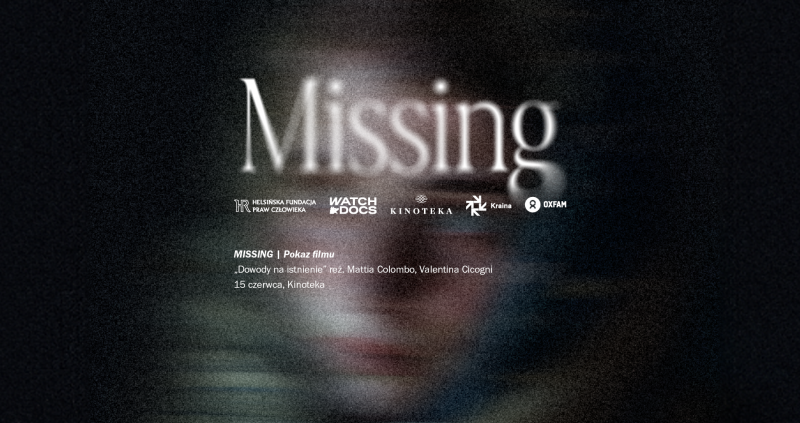MISSING | Exhibition | Screening| Debate
‘MISSING’ means absence, disappearance, a sense of loss, longing or emptiness. It is also the title of a project in which we bring the issue of the rights of people who face being forced to flee their countries of origin to Europe and the problem of their disappearance.
From 14 to 30 June, the Helsinki Foundation for Human Rights, the WATCH DOCS festival, the Kraina Foundation and Kinoteka invite you to a series of events during which photography, sound, film and conversation will bring closer the experiences and rights of missing persons and their relatives.
EXHIBITION | Waiting Room
Shamal Husamalddin Hassan has been photographing families of the disappeared on their way to Europe and an imagined better life for the past three years. The town from which the photographer hails - Ranjjaa in Iraqi Kurdistan - lies in one of the areas from which more and more young people migrate every year. Unfortunately, the trace of many of them is suddenly cut off, like a broken telephone connection, and the relatives of the disappeared search in vain for information about their whereabouts or even the circumstances of their death. These families, without legal or psychological care, sometimes exist in painful limbo for years, waiting in vain for news from the West. Shamal Husamalddin Hassan's photographs are accompanied by an installation by Konrad Smolenski consisting of sound recordings, video and light. All these elements in the author's montage emphasise a sense of acute lack. They recreate the environment of impotence and endless waiting in which the families of the missing function. They give the longing a universal dimension.
Opening: 14 June 2024, 7pm
Kraina Foundation, 67 Puławska St.
The exhibition will run until 30 June. Opening times will be available on the Kraina Foundation website.
FILM AND MEETING | ‘Pure Unknown’
WATCH DOCS on the rights of missing persons at Europe's borders - a special screening of the film ‘Proofs of Existence’ and a meeting at Kinoteka.
‘Pure Unknown’, directed by Mattia Colombo and Valentina Cicogni, is the story of the barriers to the identification of the missing and the dead faced by the protagonist of the documentary, Cristina Cattaneo, a professor at the University of Milan and one of the best forensic anthropology specialists in Europe, using methods known from archaeology in forensic science. Her work involves identifying bodies, and trying to contribute to systemic change so that a mechanism to identify and return identities is widely available. The film provides a glimpse behind the scenes of the anthropologist's work, showing the clash of the legal and human perspective with bureaucratic barriers, the crisis of European asylum policy and human trafficking. It can also be a starting point for a conversation about the need to create identification mechanisms in Poland as well.
The screening will be followed by a conversation on the availability of mechanisms to identify the victims of the humanitarian crisis whose graves are located in Podlasie cemeteries with:
Shamal Husamalddin Hassan - photographer documenting the trauma and emotions of Kurdish families whose loved ones disappeared on their way to Europe,
Marcin Sosniak - lawyer of the Migration Unit of the Helsinki Foundation for Human Rights.
Chairing: Katarzyna Czarnota - Helsinki Foundation for Human Rights.
15 June 2024, 5 pm, Kinoteka
DEBATE | The rights of missing persons in Poland
Expert debate on the rights of missing persons in Poland - ratification of the UN Convention for the Protection of All Persons from Enforced Disappearance - will the situation of migrants change?
According to the UN International Convention for the Protection of All Persons from Enforced Disappearance of 20 December 2006, enforced disappearance is any form of deprivation of liberty committed by agents of the state or by persons acting with the authority or consent of the state. During the debate, we will discuss both the practical implications of the announced ratification of the UN Convention and the current situation of the victims and the causes of the disappearances of migrants in Poland, as well as the systemic gaps that prevent their relatives from seeking justice.
The context of the discussion will include the results of the Helsinki Foundation for Human Rights' diagnostic and research project “Migrants missing at Poland's borders - legal analysis, diagnosis of the situation and recommendations for change”.
19 June, 5 pm, Kraina Foundation, 67 Puławska St.
Moderator: Anna Gmiterek-Zabłocka, TOK FM radio journalist
The debate will be held in Polish.
